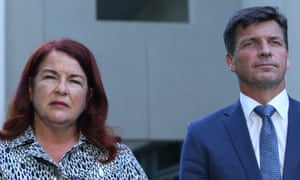Extract from The Guardian
Exclusive: environment minister lobbied on behalf of Delta
Electricity’s chair Trevor St Baker after decision to block government
support
Environment minister Melissa Price requested a review of how climate
change policy could be used to upgrade coal-fired power stations after
being lobbied by an energy company, freedom-of-information documents
show.
As revealed by Guardian Australia, the Vales Point power station in New South Wales had been registered under the emissions reduction fund, the “direct action” climate policy introduced by Tony Abbott that Scott Morrison has promised to spend another $2bn on if re-elected.
Its owners, Sunset Power International trading as Delta Electricity, wanted to bid for taxpayers’ support from the fund at an auction in December. If successful, it would have used the money as part of a $14m project to replace turbine blades at the plant.
But the bid for taxpayers’ support was blocked by the Clean Energy Regulator, which administers the fund, on the grounds the company had not provided enough information to show it would qualify for carbon credits.
Documents released under freedom-of-information laws
show a consultant working on behalf of Delta Electricity contacted the
regulator, the environment department and the offices of Price and
energy minister Angus Taylor about the decision. He asked for an “urgent
meeting” between Price and Trevor St Baker, the company’s part-owner
and a coal advocate and political donor.As revealed by Guardian Australia, the Vales Point power station in New South Wales had been registered under the emissions reduction fund, the “direct action” climate policy introduced by Tony Abbott that Scott Morrison has promised to spend another $2bn on if re-elected.
Its owners, Sunset Power International trading as Delta Electricity, wanted to bid for taxpayers’ support from the fund at an auction in December. If successful, it would have used the money as part of a $14m project to replace turbine blades at the plant.
But the bid for taxpayers’ support was blocked by the Clean Energy Regulator, which administers the fund, on the grounds the company had not provided enough information to show it would qualify for carbon credits.
The emails suggest the meeting did not take place, but Price had asked the independent emissions reduction assurance committee to review how coal-fired power stations could earn carbon credits under the climate scheme.
Kelly O’Shanassy, chief executive of the Australian Conservation Foundation, which received the freedom of information documents, said Price was within her rights to call for a review but the timing and focus on coal raised questions about St Baker’s influence and the government’s support for fossil fuels.
“The Morrison government needs to explain its relationship with Trevor St Baker, a major party donor who is seemingly pushing hard to get public money and institutional backing for his coal business,” she said.
An upgrade of the Vales Point plant has also been included on a shortlist of power generation projects the government is considering underwriting. It was the sole coal project on the shortlist released last week.
Price’s spokesman told the ABC the government frequently reviewed methods used under the emissions reduction fund to ensure they continued to meet integrity standards. She said the scheme was designed to provide funding to projects from across the economy, including industry. The minister’s office had not responded to a request for comment at the time of publication.
Green finance analysts say Australia is the only developed country with rules that allow climate change funding to be used to upgrade coal-fired power plants and that China announced in December it would no longer use green bonds to help replace old coal plants with newer technology.
Delta Electricity says the proposed Vales Point upgrade would reduce carbon dioxide emissions by 900,000 tonnes across a decade, equivalent to about 1.3% of the plant’s emissions over that time.
The Intergovernmental Panel on Climate Change last year found limiting global warming to 1.5C, a goal referenced in the 2015 Paris climate agreement, would require coal use for energy to fall 59-78% below 2010 levels by 2030.
The emissions reduction fund, now rebadged as a “climate solutions” fund, distributes cash through a reverse auction, with the cheapest proposed cuts winning contracts. The scheme has been dogged by problems with methodology and criticisms that it is not an adequate policy to deal with national emissions, which continue to rise.
There have been concerns within the bureaucracy about how emissions cuts from vegetation projects are calculated, prompting the government to propose amendments to the fund’s rules. The changes suggest some projects have been receiving more carbon credits and taxpayer money than they needed.
Most contracts have been awarded to vegetation projects, but industrial developments are also eligible. Rio Tinto received $2m to build a diesel power plant and miner Gold Fields is getting $1m for a gas-fired plant it says it would have built anyway.
The government dedicated $2.55bn to the fund after winning power in 2013, $476m of which has been paid out with another $1.8m under contract. The Coalition has promised to inject an extra $200m a year from 2021 to 2030 if in government. Labor would scrap it and restore a carbon farming initiative, focused on land-based projects.

No comments:
Post a Comment